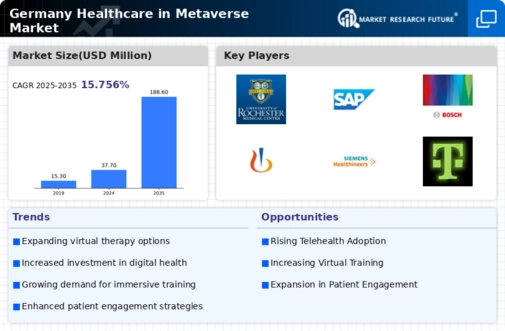Technological Advancements in Healthcare
The healthcare in-metaverse market is experiencing a surge due to rapid technological advancements in virtual reality (VR) and augmented reality (AR). These innovations facilitate immersive training for medical professionals, enhancing their skills in a risk-free environment. In Germany, the integration of VR in medical education has shown promising results, with studies indicating a 30% improvement in retention rates among trainees. Furthermore, the use of AR in surgical procedures allows for real-time data visualization, potentially reducing errors and improving patient outcomes. As these technologies become more accessible, the healthcare in-metaverse market is likely to expand, attracting investments and fostering collaborations between tech companies and healthcare providers.
Enhanced Patient Engagement and Experience
The healthcare in-metaverse market is significantly influenced by the need for enhanced patient engagement and experience. In Germany, patients are increasingly seeking more interactive and personalized healthcare solutions. The metaverse offers unique opportunities for patients to engage with their healthcare providers in immersive environments, leading to improved understanding and adherence to treatment plans. Data suggests that patients who participate in virtual health consultations report higher satisfaction levels, with 70% expressing a preference for such interactions over traditional methods. This shift in patient expectations is likely to drive the growth of the healthcare in-metaverse market as providers adapt to meet these demands.
Growing Demand for Remote Patient Monitoring
The increasing demand for remote patient monitoring solutions is a significant driver for the healthcare in-metaverse market. In Germany, the aging population and the rise of chronic diseases necessitate innovative approaches to healthcare delivery. Remote monitoring technologies enable healthcare providers to track patients' health metrics in real-time, leading to timely interventions. According to recent data, approximately 25% of German patients utilize remote monitoring tools, indicating a shift towards more personalized and efficient care. This trend not only enhances patient engagement but also reduces hospital readmission rates, thereby driving the growth of the healthcare in-metaverse market as stakeholders seek to leverage these technologies.
Regulatory Support for Digital Health Innovations
Regulatory support plays a crucial role in shaping the healthcare in-metaverse market. In Germany, the government has implemented policies that encourage the adoption of digital health solutions, including those within the metaverse. Initiatives such as the Digital Healthcare Act aim to promote telemedicine and digital health applications, providing a framework for safe and effective use. This regulatory environment fosters innovation, allowing startups and established companies to explore new opportunities within the healthcare in-metaverse market. As a result, the market is likely to witness increased investment and development of solutions that align with regulatory standards, ultimately benefiting patients and healthcare providers alike.
Integration of Artificial Intelligence in Healthcare
The integration of artificial intelligence (AI) into healthcare systems is emerging as a pivotal driver for the healthcare in-metaverse market. In Germany, AI technologies are being utilized to analyze vast amounts of health data, enabling more accurate diagnoses and personalized treatment plans. The potential for AI to enhance decision-making processes in virtual environments is particularly promising. For instance, AI algorithms can assist in simulating patient scenarios within the metaverse, providing healthcare professionals with valuable insights. As AI continues to evolve, its application within the healthcare in-metaverse market is expected to grow, fostering innovation and improving overall healthcare delivery.





















Leave a Comment